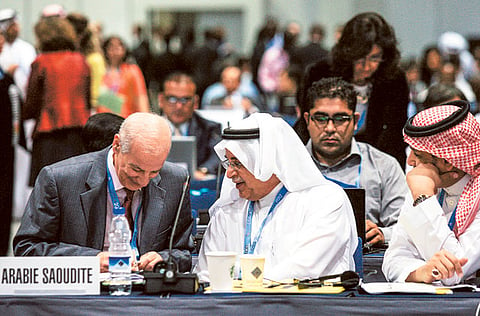Web under closer state watch
Majority of members agree to resolution at global telecommunications conference

Dubai: Delegates from more than 160 countries attending the World Conference on International Telecommunications (WCIT) have agreed to a resolution for a greater role for governments in governing the internet.
The delegates have been in Dubai for the past 10 days to revise the International Telecoms Regulations (ITRs) that was last revised in 1988 in Melbourne, Australia. The conference ends on Friday.
“The internet will not be included in the ITRs at the Dubai conference, but a resolution for more governmental role has been accepted,” said Tariq Al Awadhi, head of Arab delegation to WCIT told Gulf News.
The US, the European Union and some other countries have opposed bringing the internet under the ITRs right from the beginning and this has been one of the key topics at the Dubai conference. The approval of internet resolution was a major blow to the US-led coalition’s efforts.
The Russian-led group — including China, Africa and Arab states — want a UN backing for governments to have a bigger say on the internet.
“On Wednesday, a majority of nations have agreed to the internet resolution. The Chairman has agreed to the resolution. ITU will study the internet and it will be in the study group of member states to develop high-level governmental policy,” Al Awadhi, who is also executive chairman of TRA in UAE and head of Arab delegation, said.
Negotiations and compromises were going on among member states to reach an agreement till early in the morning.
Mohammad Nasser Al Ghanim, director general of UAE’s TRA and Chairman of WCIT, declared that majority of the member states supported resolution, without going to the voting stage.
“We will not vote on any issues. Voting means winners and losers and we believe we will come to an agreement on all issues,” ITU secretary general Dr. Hamadoun Toure, said.
Toure had said that the summit is not about internet governance but only about internet infrastructure.
Al Awadi said the chairman and secretary general of ITU has been working very hard with their representatives from the regional groups to compromise and come to a conclusion for the last two days.
“Toure made a table and jotted down all the points to make it as a package. Russia had compromised their proposal to add internet to the telecommunications treaty, at the same time Europe and US also agreed to the proposal,” he said.
In the plenary meeting, Al Awadhi said some of the European countries and US breached the package. Other groups were really frustrated and were trying to destroy the conference mood.
“We were not happy but was compromising for the sake of making this meeting a success. If Russia had brought back the internet governance issue back on the table, it would have been a big issue,” he said.
Some of the main issues being discussing are internet security, spam, management of all naming, numbering, addressing and identification resources used within their territories for international telecommunications/ICT services.
“The US is also blocking attempts by the Russia-led group to give countries control over internet addresses that would broaden the definition of agencies that the ITU’s rules govern, which is currently handled by ICANN,” said Terry Kramer, Head of the US delegation to the World Conference on International Telecommunications (WCIT):
The US also said it will block initiatives that would give states the ability to stop spammers on concern that such power would lead to censorship.
The sessions have been running since December 3 and will conclude on Friday.



